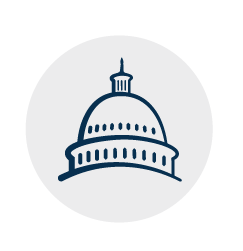Congress Continues Work on Spending Bill to Avert Partial Shutdown, Including Key Appropriations for Housing Programs; White House and Treasury Announce Housing Efforts
In a busy week in Washington, Congress, the Treasury Department, and the White House have all taken action on housing-related efforts. On March 6, 2024, by a vote of 339-85, the House passed a major spending bill to avert a partial government shutdown slated for tonight at midnight. The Senate is currently considering the bill, which packages six of the 12 Fiscal Year 2024 appropriations bills and includes funding for the Department of Housing and Urban Development (HUD). Housing and community development highlights in the bill include:
$16 billion in Project-Based Rental Assistance;
$32.4 billion in Tenant-Based Rental Assistance;
$1.25 billion for the HOME Investment Partnerships Program;
$4.05 billion for Homeless Assistance Grants;
$8.8 billion for the Public Housing Fund;
$6.7 billion for the Community Development Fund, $3.3 billion of which is allocated to the Community Development Block Grant Program;
$1.3 billion for Native American Programs;
$913 million for Section 202 Housing for the Elderly;
$208 million for Section 811 Housing for People with Disabilities;
$75 million for the Choice Neighborhoods Initiative;
$140 million for Family Self-Sufficiency; and
$505 million for Housing Opportunities for Persons with AIDS.
In addition to the appropriations activity on Capitol Hill, it was also a busy week for the federal agencies. On March 5, 2024, the Treasury Department announced a slew of recent efforts to “increase the supply of housing in the year ahead.” The announcement highlights three recent actions, detailed below, by the Treasury Department designed to increase housing stock, which the Department notes builds on the Biden Administration’s Housing Supply Action Plan.
Updated SLFRF Guidance. On March 5, 2024, the Treasury Department updated guidance for the American Rescue Plan’s (ARP) State and Local Fiscal Recovery Funds (SLFRF) to make it easier for recipients who have remaining funds to use them on additional eligible affordable housing projects. This guidance is reflected in an updated set of Frequently Asked Questions. The Treasury Department indicates that recipients funding an affordable housing project will be presumed to have used funds for an eligible use if the project will house families earning up to 120% of area median income (an increase from 65%) or if the project meets the terms of certain federal housing programs. In addition, recipients can fund certain projects supported by Fannie Mae and Freddie Mac.
Emergency Rental Assistance Clarifications. Also, on March 5th, the Treasury Department issued new clarifications to the ARP’s Emergency Rental Assistance (ERA) program to clarify that qualifying recipients that have obligated at least 75% of their funds for financial assistance, housing stability services, and administrative costs can use any remaining funds for predevelopment and acquisition costs for affordable housing serving very low-income families (in addition to other already-eligible uses). These clarifications are reflected in an updated set of Frequently Asked Questions on the ERA program.
Extension of FFB-HUD Risk-Sharing Initiative. Lastly, through a new agreement with HUD announced at the end of February, the Treasury Department is indefinitely extending the Federal Financing Bank’s (FFB) financing support for the Section 542(c) Housing Finance Agency Risk-Sharing Initiative between HUD and state and local housing finance agencies, which was re-started by the Biden Administration in 2021. This effort is intended to lower the cost of capital for certain low-risk housing developments.
Finally, on March 7, 2024, the Biden Administration published a new fact sheet highlighting President Biden’s plan to lower housing costs for working families, which provides a preview of his upcoming Fiscal Year 2025 Budget. In his State of the Union Address, the President called on Congress to pass legislation to lower housing costs by providing a $10,000 tax credit for first-time homebuyers and people who sell their starter homes by supporting private sector construction or renovation of over 2 million homes; and by lowering costs for renters. Specifically, President Biden’s plan includes a call for expanding the Low-Income Housing Tax Credit to build or preserve 1.2 million more affordable rental units. It proposes a new $20 billion competitive grant fund as part of his upcoming Budget to support the construction of affordable multifamily rental units. Other highlights of the plan include efforts to lower costs for renters, such as launching efforts to combat rent gouging and a call to establish a new Neighborhood Homes Tax Credit to cover the gap between the construction cost and sales price for single-family homes in certain communities.
With respect to the House-passed tax bill that contains our housing credit provisions, it continues to lounge in the Senate. There are conversations on how the Senate might move the legislation, but supporters' concern is that any changes to the bill would require it to go back to the House for another vote. There are also conversations among Republican Senators who want to vote on the current bill and those who want changes. It remains a fluid situation, but we continue to be hopeful that, in the end, a vote to approve the bill passed by the House will occur with a favorable result. We encourage you to continue your outreach to Senate Republicans to urge them to support the tax bill.

